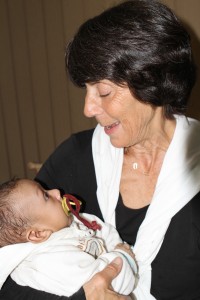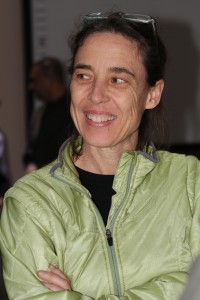Finding sorrow over the Boston bombings in a land that knows bombings too well, by Gerri Haynes
(Gerri Haynes, former president of Washington Physicians for Social Responsibility, has returned to Gaza with a delegation of doctors, nurses and others interested in helping the people there. Gerri will be sending back reports.)
Day Three in Gaza
Nearly every person I met today expressed sorrow over the bombing in the U.S. This kindness and concern over the tragedy at the Boston marathon was particularly tender from people whose land has been bombed so frequently and so recently.This afternoon, several of us visited Ard El Insan Child Nutrition Center. I’d read that the level of chronic malnutrition in Gaza is over 10 percent. The Center sees hundreds of children each day and has ongoing research regarding their nutritional status. The director told us they are noting that about 3.2 percent of children in Gaza have acute malnutrition and over 13 percent are chronically malnourished. Chronic malnutrition carries many ominous characteristics – growth stunting, diminished ability to learn, lessened immunity among them. The benefits of breastfeeding are emphasized and milk supplementation for infants is strongly discouraged. Dr. Adnan came to Gaza on a temporary job assignment in 1987 and has remained – the work and the people being too compelling to allow him to leave. His work is internationally known.
This afternoon, the cousin of a young man who is working with us brought his four-month-old baby to be examined by members of our delegation. The baby is growing slowly and the parents are concerned about his neurologic status. We do not have a pediatric neurology member in our group, but we helped the mother with breastfeeding and normal childcare and will refer them to Ard El Insan’s pediatricians.
Karin Huster, R.N., writes of her experience in Gaza:“It took a few minutes of observation in the Al Shefa emergency department to shred my plans and revisit how I can be of most use here. Aside from teaching by giving a few nursing-focused lectures at the university or at the hospital (for the future, on topics that they can really use), I know that what I can do is learn as much as I can from them and bring back their stories to share — raising more awareness about Gaza – and as far as health is concerned, knowing a little better what it is that we can share with them given their situation. Teaching them the “American way” is not useful – things do not change in a few weeks, particularly in this situation.
“My days are spent in the ED, observing what they do and how they do it. The chaos is incessant, yet the staff goes about their business; they see close to 700 individual patients per day (family members not included). While at home we strive for documenting data and making data-based decisions, here data documentation is not a focus – too many patients to care for quickly. How can you worry about data when you have so many patients to care for?
“Overcrowding, sorely lacking resources, and a seemingly chaotic system make care as we know it very different. Drug shortage seems to be an issue. Pain medicine is limited to intramuscular Tramadol or Diclofen. Patients do not get pain relief as they do in America. Vital signs in the ED are seldom taken and are not recorded. Gloves are used as tourniquets. Hand washing is not part of the nursing care. Where I am at Gaza’s main ED, the CT scanner has been broken for 6 months (parts are not available due to the siege). Patients needing a CT scan are transferred to another hospital. I’ve ridden with a patient in the ambulance through town – the traffic is extreme and we had “near misses” at every corner. Probably the one and only public good I’ve done so far was to convince the ambulance driver to wear his seatbelt – and I held the hand of a very scared and brave 9-year-old badly injured patient.
“Otherwise, the falafels are out of this world, and I could eat them every day. Their sweets are also out of this world, and I make it a habit of trying a few everyday. The Gaza people are very welcoming and very kind. Today, several mentioned the Boston marathon bombings and expressed their sorrow to us. What a resilient and truly generous people.
I already feel at home here — I know I will be back.”
RSS feed for comments on this post. TrackBack URI

